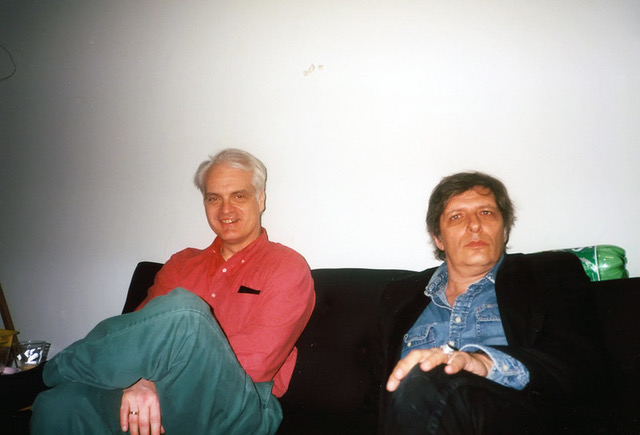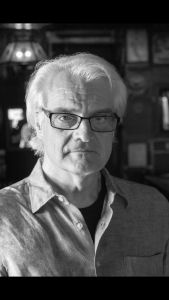Big Lew
Thirteen people with 13 opinions sat around a rickety folding table in St. Mark’s Parish Hall. I was part of the crew. It was a ‘90s Poetry Project workshop dedicated to editing The World, the Project’s literary magazine. Things were getting a bit heated, but somehow, Lewis Warsh, the workshop leader, let everyone have their say while he effortlessly steered the proceedings.
I was reluctant to join the workshop because I had a bad experience in a class run by a self-involved, highly placed academic writer. But my longtime poet friend Phyllis Wat kept gently insisting I attend. “This will be different,” she said. “I keep hearing that Lewis is really excellent.” She was right.
At first, Lewis seemed a bit shambolic, rumpled, and diffident. Crooked glasses. A distracted air. I don’t think he liked me very much because he sensed my ambivalence about being in the workshop. Sometimes I was defensive and overly opinionated, but he was patient, the workshop started to fire on all cylinders, and I was consistently impressed.
I knew from my past teaching experience that the Socratic method is a powerful learning tool, but I don’t think I’ve ever seen anyone wield it so well. He created a cohesive team where everyone was a major player and learned a great deal along the way.
After the editing workshop began, I picked up a copy of Lewis’ then-recent book, Information From the Surface of Venus, along with some of the Angel Hair and United Artists books he edited and published. That’s when I realized I was lucky enough to be working with a highly accomplished poet who had a genuine, selfless commitment to supporting other poets’ work. Such a rare combination in the world of poetry!

Information From the Surface of Venus remains one of my favorite poetry books because the work is strong and there’s a sentimental feeling attached. It’s the book that opened my eyes to the full scope of Lewis’ talents, which I’ve enjoyed for 30 years, and it marked the beginning of our long friendship.
That editing workshop produced six issues of The World before it ended. Then some of us joined his writing workshop at The Project, which ultimately became a private workshop at the Park Avenue South loft of the late performer/poet Be LaRoe, who brought her own unique perspective to the proceedings through her involvement with The Living Theatre and the experimental theater world. This workshop had a long run—six years!—and spawned Ten Pell Books, a cooperative publishing venture named after the address of a favorite Chinatown restaurant.
Ten Pell produced nine poetry books by Donna Cartelli, Lydia Cortés, Be LaRoe, Lilla Lyon, Michele Madigan Somerville, KB Nemcosky, Noam Scheindlin (with art by Paul Moran), Phyllis Wat, and me. The workshop was also the launchpad for books by Merry Fortune and Ruth Altmann that appeared under other publishers’ imprints. Lewis often said he learned as much as we did during those intense, fulfilling years of the Never-ending Workshop.
Over his lifetime, Lewis (aka Big Lew) authored an impressive 35 books of poetry, fiction, and autobiography. He also championed the work of other writers in many ways. A perfect example: John Wieners’ remarkable book 707 Scott Street saw the light of day because Lewis expressed interest in Wieners’ trunkful of journals. Wieners gave one to Lewis, who recalled that he was “initially shocked that he would simply hand over one of his intimate journals … (casually, as if he were offering me a taste from a box of bonbons) … but I accepted the gesture as an act of trust, a gift, an offering.” He took it home, typed it up, and ultimately it became a book for us to enjoy. The key words in this anecdote: “Trust.” “Gift.” “Offering.”
I remember Lewis would often start his workshops with an elegant gesture that featured his dramatic, oversized ring. Then he’d almost whisper a seductive invitation: “Shall we begin … yes?”
Many people answered his call because they knew they could trust him. They knew the value of the generous gifts and offerings he made over the years through the power of his work and his ongoing, quiet support of the writing community.
Thanks, Lewis. I’m glad we had some time together.
•
For Lewis
Lewis Warsh (1944-2020)
I try to memorize every tic
every way of your presence
so my memory has a
sticking point and won’t float free.
It’s an old story no secret
we carry our specifics
until we can’t anymore
then others pick them up
and carry forward the music:
your elegant loaded gestures
in mid-air with your words
that etched but felt light
and seemed like a shrug.

PETER BUSHYEAGER’s poems have appeared in New American Writing, Local Knowledge, Café Review, Sensitive Skin, and The Portable Boog Reader 12. His poetry collections include In the Green Oval and Citadel Luncheonette. He is editor of Wake Me When It’s Over: Selected Poems of Bill Kushner. Tom Haynes photo.

